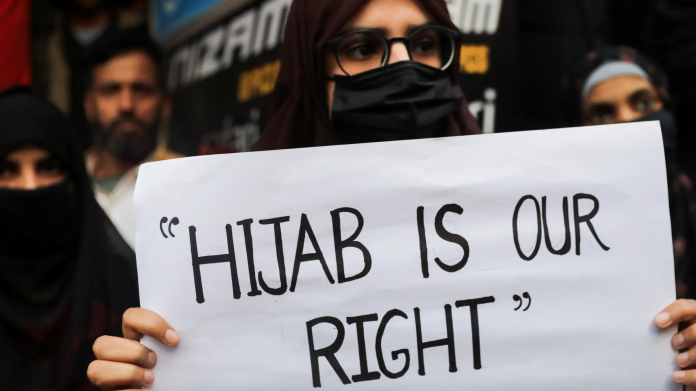Women students, activists fear the ban on the Hijab will now extend to educational institutions in the state where it was previously allowed.
Muhammad Raafi | TwoCircles.net
BANGALORE — As the Karnataka High Court upheld the ban on Hijab, students, and activists termed the court verdict as “discriminatory, humiliating and hurtful.”
Soon after the court pronounced the verdict on Tuesday, Muslim students in various schools and colleges across the state boycotted the classes in protest.
Karnataka has remained on edge after a group of girls were prevented from wearing the Muslim headscarf during school time in December last year.
Navida Asadi, a Muslim activist based in Hassan city of Karnataka told Twocircles.net that Hijab is about the modesty of the Muslim women who practice it. “We will not compromise on our modesty,” she said, “It is also our constitutional right to practice our religion and we will not sacrifice that right.”
Asadi said that the rights and the religious freedom of Muslim women cannot be curbed in the name of secularism. “Secularism is not meant to erase our religious identity.”
Scores of Muslim girls have not attended their schools or colleges in the last month due to the initial interim ban on Hijab while many have missed their exams.
In Hassan city, a Muslim girl was not allowed to appear in her practical exams as the invigilator asked her to remove the Hijab, which she didn’t. She missed the exams and lost her academic year.
Hiba Sheikh, a student of Government First Grade College, Mangalore told TwoCircles.net that she will not attend the classes till the ban is not revoked. She said she will continue the fight and said the court verdict was “discriminatory” as it goes against the teachings of Islam. “Hijab is an essential practice in Islam.”
After weeks of deliberations, the Karnataka High Court ruled that the wearing of the hijab “does not form a part of essential religious practice in the Islamic faith.”
The court ruled that schools have valid grounds to set dress codes prohibiting headdresses in the interest of avoiding religious and other divides.
“The aim of the regulation is to create a ‘safe space’… and the ideals of egalitarianism should be readily apparent to all students,” the court said.
In Islam, wearing Hijab is an important article of faith for Muslim women, and many in Karnataka said that Muslim girls have worn it in schools for decades, just as Hindus, Sikhs, and Christians have done with their religious insignia.
The state high court initially ordered a temporary ban on the wearing of all religious symbols, including Hindu and Christian ones, in schools.
Schools later reopened under heavy security with a ban on gatherings of more than four people.
In several instances authorities made teachers and students take off their hijab publicly at the school gate.
Muslim women said that the ban on hijab violates their religious freedom guaranteed under the constitution of India and that they rather would stay home rather than go to schools or colleges without hijab.
Sumaiyya Roshan, a student activist based in Karnataka told TwoCircles.net that the ban is disappointing. “It is unfortunate and inappropriate for the court to give such a verdict when all Muslim women who observe Hijab have stated from the beginning that it is their religious right and it is an important part of their religion.”
Roshan said, “the women practice Hijab to assert ‘our Muslim identity and it is a way of submission to God. That is the most important thing, and that is the entire objective of donning a hijab.”
She is apprehensive that now the schools and colleges where Hijab wasn’t an issue earlier might also come up with such restrictions. “It is hurtful. We have always had faith in the judiciary. But it has disregarded the choices and religious freedom. It isn’t acceptable to us.”
Muhammad Ibrahim, father of Aaliya Meher, a student of pre-university college school in Shivamogga district said that the court verdict is tantamount to attacks on Muslim symbols and practices and is “part of the Hindu far-right agenda of imposing majoritarian values on minorities.”
The Karnataka High Court order said that it studied the Quranic inscriptions and hadith and decided that hijab is not essential. However, Anas Tanvir, a Supreme Court lawyer, believes that the court has made a mistake in this regard. “The court has created a dichotomy between freedom of conscience and freedom of religion and said that those who have freedom of religion do not have freedom of conscience. It is a mistake, it is the wrong interpretation of the law,” Tanvir said.
Rekha Sharma, the chairperson of the National Commission of Women has, however, welcomed the decision. “It is firstly not a religious practice, as per Quran. Secondly, when a student enters an institute, they must follow the rules & regulations,” she told the media after the verdict.
Calling herself an ‘ardent supporter of women’s rights,’ she said she has always said women can wear anything, anywhere, but if there’s a uniform code in an institute, it must be followed.
Muhammad Raafi is a journalist based in New Delhi. He tweets as @MohammadRaafi


